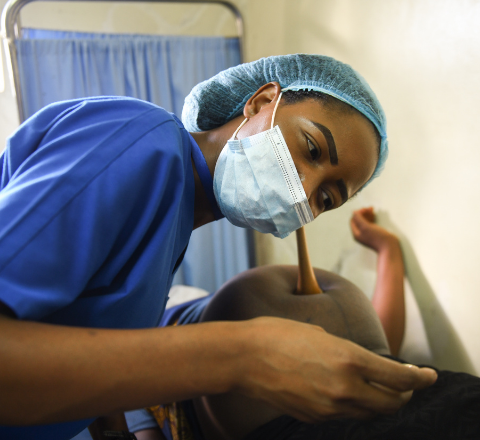Pressing for Progress: Gender Equality
Browse these resources to find out how THET and our partners are pressing for progress and how you can contribute to gender equality in global health!

Toolkit: Gender Equality and Social Inclusion Toolkit for Health Partnerships
As outlined in the Sustainable Development Goals (SDGs), gender inequality and social exclusion are inextricably linked to social, economic and health outcomes as root causes of poor health and wellbeing. Efforts to address gender inequality and social exclusion lead to long-lasting and sustainable change. A Gender Equality and Social Inclusion (GESI) approach is therefore essential for the success of the Health Partnership model.

Toolkit: Gender Equality Toolkit for Health Partnerships
This toolkit supports Health Partnerships to address issues of gender inequality in their work.

Report: Exploring Gender Equality in the Health Workforce
This study identifies and explores the main enabling factors and barriers posed to gender equality for health professionals in LMICs.

Interview: Five Questions With…Dr. Amina Jama Mahmud
We spoke to Dr. Amina Jama Mahmud on why increasing opportunities for women’s leadership is so important, how this can be done in practice, and why we must #BreakTheBias to spark change and accelerate progress towards a gender-equal world.

Blog: Working Together to Save Lives: Delivering quality maternal healthcare in Malawi
Every woman deserves access to quality healthcare. In this interview, we hear from Pilirani Makungwa on how COVID-19 has impacted maternal health outcomes and quality of care, and how working in partnership has offered effective solutions.

Blog: #BreakingTheBias to Leave No One Behind
Ethel Mukosa, THET’s Project Support Officer in Zambia, sheds light on the main challenges facing women working in and seeking healthcare in Zambia, how THET has contributed to gender equality in the country, and the significance of IWD for the global health community. I was raised by a mother who

Programme: Nursing Now Challenge Fellowship Programme
With Funding from the Burdett Trust for Nursing, we are raising the status of women, who comprise the majority of the nursing and midwifery cadres, within the health workforce through structured leadership training.

Blog: #ChooseToChallenge: Challenging stigma and empowering mothers of children with disability in Rwanda
Through our Africa Grants Programme, University College London Hospitals and Partners In Health/Inshuti Mu Buzima in Rwanda have partnered to support mothers of children with disability. Find out how these mothers #ChooseToChallenge the discrimination and exclusion they can face in their communities.

Interview: Five Questions With…Allison Burden
We spoke to Allison Burden, Programme Director of CARE International and Honorary Advisor for THET, on why increasing opportunities for women’s leadership is so important, how this can be done in practice, and why we must #ChooseToChallenge ourselves and those around us to spark change and accelerate progress towards equality and inclusion.

Blog: Championing Health Equity Through Women’s Leadership in Ethiopia
Dr Meti, our Non-Communicable Disease Focal Person at Woreda 6 Health Center in Ethiopia, shares her views on championing change through women’s leadership and why women's health goes beyond the rights of one individual.

Resource Hub: Gender and COVID-19
Pre-existing gender gaps risk intensifying the adverse effects of COVID-19. It is important to understand the different ways that the pandemic and accompanying economic crisis may affect gender equality outcomes.

Blog: Gender Disparity in a Time of Global Crisis
THET Grants Officer, Audrey Arbaud, sheds light on the need for a gender-specific response to COVID-19

Programme: COVID-19: Cementing Support for Women and Girls
As THET moves to support those on the frontlines of the COVID-19 pandemic, we are extremely grateful to have received a contribution to our newly established Health Worker Action Fund from the Fraxinus Trust.

Blog: Striving for Gender Equity in the Decade of Delivery
Jessica Fraser, THET Grants Officer, reflects on what more needs to be done to achieve gender equity in health and how THET is contributing to this in the Decade of Delivery.

Blog: From the classroom to the hospital ward: Dr Lydia Namatende-Sakwa on gender mainstreaming in Uganda
Following the publication of our latest study, Exploring Gender Equality in the Health Workforce, we spoke to Dr. Lydia Namatende-Sakwa, who supported the development of this report.

Programme: Transforming THET and Health Partnership’s approach to gender’
With funding from the Fraxinus Trust, we are working to strengthen the way in which THET and Health Partnerships consider gender in their projects.

Interview: Five Questions With…Dr Matshidiso Moeti
We caught up with Dr Matshidiso Moeti, the first woman to be elected WHO Regional Director for Africa, to discuss the positive impact that women have on global health and the challenges women face in the global health workforce

Blog: “Having a healthier and educated work force which women are part of is an asset to any country.”
On International Women's Day 2019, we caught up with Dr Thinn Hlaing, THET Country Director for Myanmar.

Blog: Somaliland Spotlight: Ensuring Gender Equity in Health Programming
Roda Ali Ahmed, a Lecturer at the University of Hargeisa, Somaliland, reflects on the importance of ensuring gender equity in health programming.

